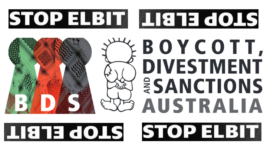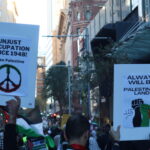Australian University Severs Ties with Israeli Company Over Genocide in Gaza

The genocide taking place in Gaza has been nonstop for over 30 days now. The death toll in what the UN is calling the “children’s graveyard” has surpassed 10,000 people, with over 70 percent of the dead being women and children. And there’s no sign of this massacre coming to an end.
The unbridled bloodlust on display is incomprehensible, especially as Israel has cut off water, food, medicine, electricity and fuel entering into the 40-odd-kilometre-long strip of land that has been kept smothered under a sixteen-year blockade, virtually operating as “an open-air prison”.
And one can be assured that much of the destruction that has been wrought on one of the most populated places on the planet has been facilitated by Elbit Systems: Israel’s largest privately-owned weapons developer, which produces around 85 percent of Israeli drones and land equipment.
Just as Israel has been given carte blanche from the western allies in terms of unleashing its wrath upon a Palestinian civilian population trapped inside the walled-off city, Elbit too, appeared to be absolved of its on-the-ground sins, when it entered into partnership with RMIT University last year.
However, on Tuesday, Boycott, Divestment and Sanctions (BDS) Australia reminded the public that the use of force is not the only way to achieve change, as, after a year of student-led nonviolent protest against the Elbit deal, RMIT announced it has completely withdrawn from it.
Nonviolent agitating
The Victorian state government announced its partnering with Elbit Systems Australia (ELSA) in February 2021, which involved establishing an artificial intelligence development centre in Melbourne, while in June 2022, it became clear that this project would be co-run by RMIT University.
Word on RMIT’s involvement came on the back of a successful campaign against Elbit Systems, which had seen Australia’s Future Fund and a Norwegian pension fund discontinue any further investment with the Israeli weapons producer, due to its involvement in making cluster munitions.
Elbit denied that it does make cluster bombs, which are deemed illegal under an international treaty. And this wasn’t the first severing of ties with Elbit, thanks to BDS campaigning. In fact, the Israeli company has also been implicated in producing white phosphorus weapons, which are also banned.
So, after the deal was on the table, PFUUPE, Palestine’s largest academic and tertiary union wrote to RMIT calling on it to suspend its dealings with Elbit. And this was followed by a series of student-led protests and an online petition.
As BDS tells it, two local activists, Shane McCartin and Mark Bradbeer staged a weekly picket against the RMIT deal in front of the university campus for eight and a half months, with the protests numbers swelling over time.
Then, on 19 October, two weeks into the Gaza genocide, 80 Students for Palestine activists demonstrated at RMIT, and the university has since released a statement outlining that it’s terminated its relationship with Elbit, and it no longer has any dealings with any of its subsidiaries.
From the bottom up
As BDS Australia convener Hilmi Dabbagh told Sydney Criminal Lawyers a few years back, the 2005-established campaign to boycott Israel is based on a similar tactic taken by the South African Anti-Apartheid Movement.
“Every week, somewhere in the world another council or church or sporting team says no to Israel,” Dabbagh said in 2019. “In comparison, in South Africa, the boycott phenomenon started around 1949. They got their freedom and apartheid finished in 1994 – 45 years later. “
“There are commentators who think what the BDS movement has achieved against Israel has been much faster. It can be understood because of the social media and the modern communications we have at this time.”
And he added, “We are hoping we will get our freedom, similar to South Africa.”
Back in 2019, to suggest Israel was subjecting the Palestinian population to an apartheid regime, or the “systematic oppression and domination by one racial group over” another, was almost unspeakable.
But since Amnesty International released an evidence-based report determining that the social system operating in Israel as an apartheid state in February last year, the clarity around how the nation is functioning and the trepidation involved in speaking out about it are dissolving.
An Al Jazeera report this year reveals that Israel is employing such all-pervasive surveillance upon Palestinians living in Israel and the occupied territories that these systems almost operate without human intervention and cameras are prying directly into some people’s living rooms.
Amnesty’s pronouncement came at the same time as 30 artists pulled out of last year’s Sydney Festival, in protest of one of the event’s partners being the Israeli Embassy. And such a blatant thumbing of the nose at the Israeli state from such a distinguished event was unprecedented.
A turning point
Israeli prime minister Benjamin Netanyahu was re-elected late last year, fronting up the most right-wing government the settler colonial nation has ever seen.
Since then, the country has been in intensifying turmoil as politicians have been trying to shut down the power of the judiciary, whilst the government has been increasing illegal Israeli settlements in the occupied West Bank, in an ever-increasingly violent manner.
Netanyahu is now suggesting that Israel is going to have to reoccupy the Gaza Strip, and whilst the Biden administration states that it doesn’t agree, it further makes clear that if the two heads of state don’t see eye-to-eye on every issue then that’s okay.
But all the while, the US continues to uphold Israel’s right to self-defence, as if this determination allows Tel Aviv to continue its genocidal mission, which is a line being echoed by all of its vassal states allies, including Australia.
Victories such as the campaign to see RMIT pull out of its deal with Elbit are important right now, as it hints at the fact that there are nonviolent possibilities ahead, despite the current horrors that are unfolding.
“This is a significant victory for the Boycott, Divestment and Sanctions movement in Australia,” said Dabbagh in a statement this week.
“Australian universities have been put on notice that they will be targeted if they partner with any Israeli company or institution complicit in human rights abuses and attacks on Palestinians.”







